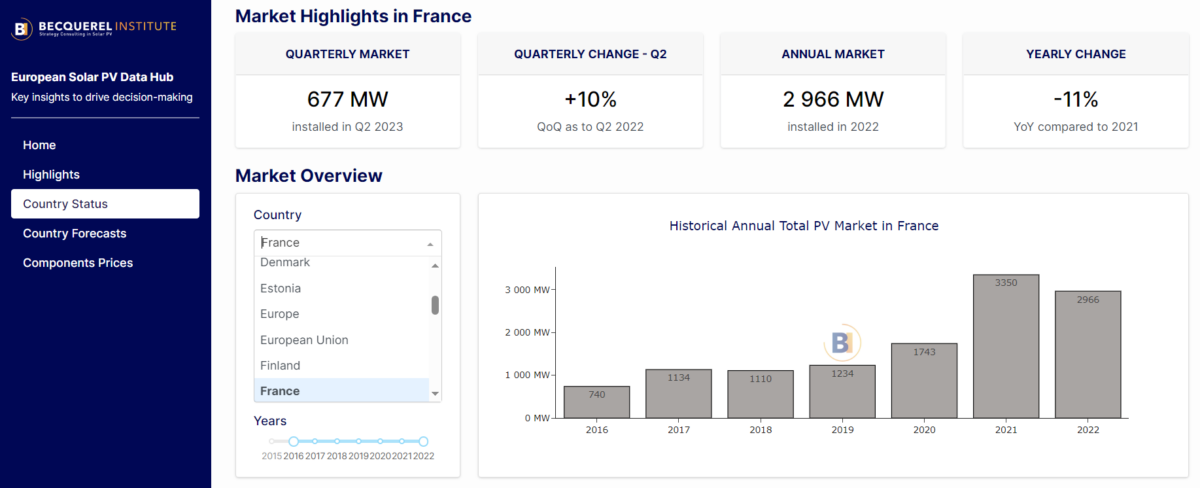Brussels-based consultancy firm, the Becquerel Institute, launched its new online platform titled the European Solar PV Data Hub last week at the European Photovoltaic Solar Energy Conference in Lisbon. The Data Hub includes quarterly and yearly market data updates for all European countries, with forecasts and component pricing reports available to buy.
The company’s COO Philippe Macé told pv magazine today that while the platform aims to provide users a way to access solar PV market data “easily”, its other purpose is to shrink the industry’s “information gap”.
“In the industry, we get people outside of the world of PV asking us, ‘What's the size of the market in this country?’ ‘How does it compare with the total European markets?' And ‘Why can I not find this data?',” he said. “We would like to reduce that information gap.”
A team of Becquerel Institute analysts “clean” and “normalize” supplied information – such as solar PV installed capacity – provided by each country’s peak solar association or regulator and the International Energy Agency Photovoltaic Power Systems Programme (IEAPPSP), with the Data Hub acting as an aggregator. The information is easier to collect from larger markets as bigger countries are “well organized,” Macé said. “Germany, for instance, is quite easy to collect data,” he explained, “but in France, for example, you have different sources, and they are often contradictory.”
“We aggregate the data but we cross-check between sources, and most importantly, we make a choice on what's the most reliable and probable number we should display,” he said. Examples of European countries where it is difficult to provide reliable market data include Estonia and Slovenia. But the Becquerel Institute has a way around it. “For these ones, it is much harder to get data, so we make estimates, we make informed guesses based on feedback from, if not actually local people, some people in the neighboring markets,” Macé said.
The information is then pumped into charts that display annual market share per segment, cumulative installed capacity per year and year-on-year market growth. While the information provided on these pages, such as “highlights” and “country status”, is free, other segments on the Data Hub are not.
For a fee, users can receive “country forecasts” up until 2027 – comprising figures per market segment and a comparative European map, among other features – and “custom-made reports” responding to a “client’s need”, the Data Hub website states. This would take the form of “components prices” and include additional aggregated data, such as global solar PV spot prices, and “pricing trend” analysis.
Asked why the press release and website state “our portal is currently free” when the whole portal is not currently free, Macé clarified: “I would say that half of it is free. The rest is not behind a paywall but restricted access.” The Becquerel Institute has “no” plans to charge users for any of the free information, Macé said, adding there was no “single price” scheme currently in use and the price is determined per customer.
The Data Hub’s target market is “basically everybody”, Macé said, with a focus on project developers, manufacturers and governments. The website is running as a minimum viable product until the end of the year. Macé said the Becquerel Institute welcomes feedback on the platform.
This content is protected by copyright and may not be reused. If you want to cooperate with us and would like to reuse some of our content, please contact: editors@pv-magazine.com.



1 comment
By submitting this form you agree to pv magazine using your data for the purposes of publishing your comment.
Your personal data will only be disclosed or otherwise transmitted to third parties for the purposes of spam filtering or if this is necessary for technical maintenance of the website. Any other transfer to third parties will not take place unless this is justified on the basis of applicable data protection regulations or if pv magazine is legally obliged to do so.
You may revoke this consent at any time with effect for the future, in which case your personal data will be deleted immediately. Otherwise, your data will be deleted if pv magazine has processed your request or the purpose of data storage is fulfilled.
Further information on data privacy can be found in our Data Protection Policy.